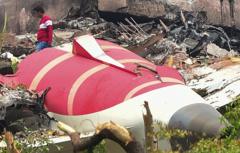Air India's London-bound 787-8 Dreamliner crashed last Thursday, resulting in the death of at least 270 individuals, primarily passengers. In the aftermath, India's Aircraft Accident Investigation Bureau (AAIB) is currently assessing whether the flight data recorders and cockpit voice recorders, commonly known as "black boxes," will be inspected domestically or sent abroad for analysis. While several media reports suggested that the recorders would be dispatched overseas, the Ministry of Civil Aviation has clarified that no final decisions have been made regarding their analysis.
The AAIB is expected to evaluate where the recorders will be analyzed, taking various technical, safety, and security factors into account. Significantly, both sets of Enhanced Airborne Flight Recorders (EAFRs) have been successfully retrieved from the crash site, which occurred shortly after the aircraft departed from Ahmedabad airport on June 13. These dual devices play a crucial role in addressing questions surrounding flight performance, cockpit communications, and ultimately the cause of the incident.
There are concerns, however, that the recorders may have sustained damage due to a fire following the crash, which could complicate data recovery in India. Captain Kishore Chinta, a former investigator with the AAIB, indicated that one of the recorders could potentially be sent to the U.S. This would allow data recovered in India to be compared with information shared with the U.S. National Transportation Safety Board (NTSB). Despite the inauguration of a new AAIB lab in Delhi in April, its operational capacity for EAFR downloads remains uncertain.
In related developments, Air India's chairman stated that one engine of the crashed aircraft was newly installed while the other had maintenance scheduled for December. The airline has conducted inspections of 26 of its 33 Boeing 787-8 and 787-9 aircraft, giving them a clean bill of health for service. The aviation regulator has mandated heightened safety inspections on the Boeing 787 fleet following the tragic event.
As a precautionary measure, Air India has announced reductions in flights on 16 international routes and the suspension of services to three overseas destinations between June 21 and July 15. This decision is part of a broader strategy to enhance preflight safety checks in light of the crash and additional operational adjustments necessary due to airspace limitations in the Middle East.
The AAIB is expected to evaluate where the recorders will be analyzed, taking various technical, safety, and security factors into account. Significantly, both sets of Enhanced Airborne Flight Recorders (EAFRs) have been successfully retrieved from the crash site, which occurred shortly after the aircraft departed from Ahmedabad airport on June 13. These dual devices play a crucial role in addressing questions surrounding flight performance, cockpit communications, and ultimately the cause of the incident.
There are concerns, however, that the recorders may have sustained damage due to a fire following the crash, which could complicate data recovery in India. Captain Kishore Chinta, a former investigator with the AAIB, indicated that one of the recorders could potentially be sent to the U.S. This would allow data recovered in India to be compared with information shared with the U.S. National Transportation Safety Board (NTSB). Despite the inauguration of a new AAIB lab in Delhi in April, its operational capacity for EAFR downloads remains uncertain.
In related developments, Air India's chairman stated that one engine of the crashed aircraft was newly installed while the other had maintenance scheduled for December. The airline has conducted inspections of 26 of its 33 Boeing 787-8 and 787-9 aircraft, giving them a clean bill of health for service. The aviation regulator has mandated heightened safety inspections on the Boeing 787 fleet following the tragic event.
As a precautionary measure, Air India has announced reductions in flights on 16 international routes and the suspension of services to three overseas destinations between June 21 and July 15. This decision is part of a broader strategy to enhance preflight safety checks in light of the crash and additional operational adjustments necessary due to airspace limitations in the Middle East.





















